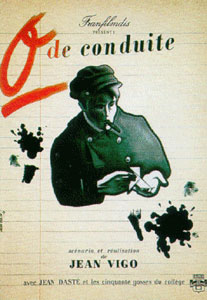Zero de Conduite
| Zero for Conduct | |
|---|---|

Film poster
|
|
| Directed by | Jean Vigo |
| Produced by | Jean Vigo |
| Written by | Jean Vigo |
| Starring | Jean Dasté |
| Music by | Maurice Jaubert |
| Cinematography | Boris Kaufman |
| Edited by | Jean Vigo |
|
Production
company |
Argui-Films
|
| Distributed by |
Gaumont Film Company Comptoir Français de Distribution de Films Franfilmdis |
|
Release date
|
7 April 1933 |
|
Running time
|
41 minutes |
| Country | France |
| Language | French |
| Budget | ₣200,000 |
Zero for Conduct (French: Zéro de conduite) is a 1933 French featurette directed by Jean Vigo. It was first shown on 7 April 1933 and was subsequently banned in France until 15 February 1946.
The film draws extensively on Vigo's boarding school experiences to depict a repressive and bureaucratised educational establishment in which surreal acts of rebellion occur, reflecting Vigo's anarchist view of childhood. The title refers to a mark the boys would get which prevented them from going out on Sundays.
Though the film was not immediately popular, it has proven to be enduringly influential. François Truffaut paid homage to Zero for Conduct in his 1959 film The 400 Blows. The anarchic classroom and recess scenes in Truffaut's film borrow from Vigo's film, as does a classic scene in which a mischievous group of schoolboys are led through the streets by one of their schoolmasters. Director Lindsay Anderson has acknowledged that his own film if.... was inspired by Zero for Conduct.
Four rebellious young boys at a repressive French boarding school plot and execute a revolt against their teachers and take over the school.
In late 1932 Vigo and his wife Lydou Vigo were both in poor health and Vigo was at a low point in his career. He then met and befriended Jacques-Louis Nounez, a rich businessman who was interested in making films. Vigo discussed the idea of a film about his childhood experiences at a Millau boarding school and Nounez agreed to finance it.
Zero for Conduct was shot from December 1932 until January 1933 with a budget of 200,000 francs. Vigo used mostly non-professional actors and sometimes people that he spotted on the street. The four main characters are all based on real people that Vigo had known in his youth. Caussat and Bruel were based on friends from Millau, Colin was based on a friend he had known in Chartes and Tabard was based on Vigo himself. The teachers depicted in the film were based on the guards at La Petite Roquette juvenile prison where Vigo's father Miguel Almereyda had once been an inmate. The film's soundtrack was poor in quality due to budgetary constraints but Vigo's use of poetic, rhythmic dialogue has been said to make it much easier to understand what characters are saying. At one point in the film, Tabard tells his teachers "shit on you!", which was once a famous headline in a French newspaper that Vigo's father had directed at all world governments. Vigo's poor health became worse during the film's production but he was able to complete the editing.
...
Wikipedia
